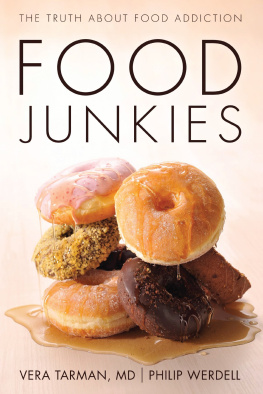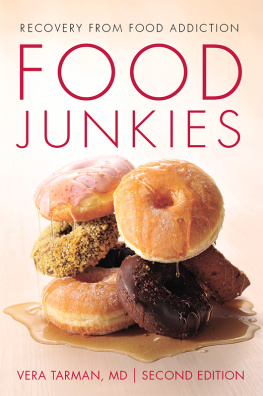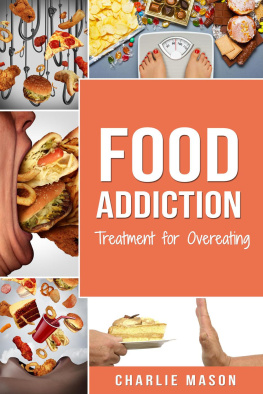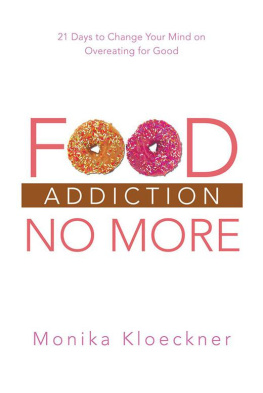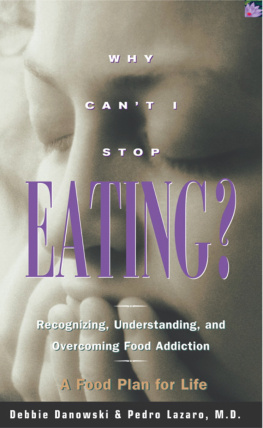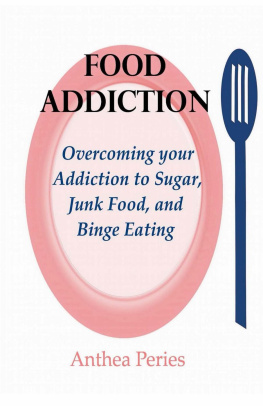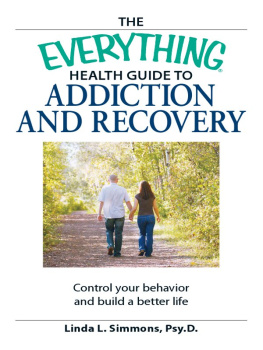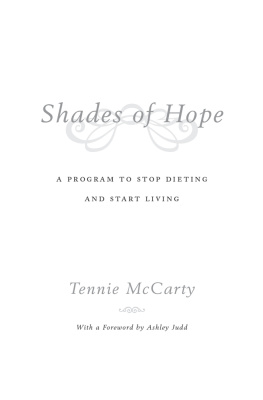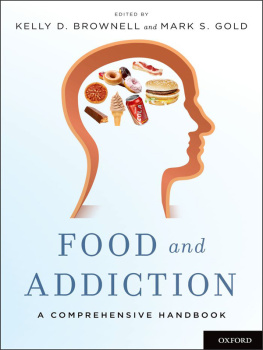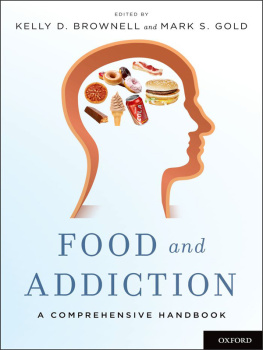THE TRUTH ABOUT FOOD ADDICTION

Are you one of those people who thinks food addiction isnt real? Then you might be what Dr. Vera Tarman describes in her new book as a Food Junkie! I was addicted to sugar and other processed carbohydrates over a decade ago and found my way back to health and recovery thanks to some basic lifestyle changes that made me whole again. Dr. Tarman walks you through all the necessary steps to make that happen for you too. Addiction is real, but its not inevitable. Grab back control of your health NOW!
Jimmy Moore, author of Cholesterol Clarity and Keto Clarity and creator of the Livin Vida Low-Carb blog: www.livinlavidalowcarb.com/blog
For all those who have struggled with weight loss and failed, here is a wise book that applies the addiction model to food. Tarman tackles the neurobiology of pleasure and the epidemic of obesity and makes sense of both. With a no-nonsense approach, Tarman offers a thoughtful, groundbreaking exploration of a subject that plagues the majority of readers.
Ann Dowsett Johnston, author of the bestselling Drink: The Intimate Relationship Between Women and Alcohol
THE TRUTH ABOUT FOOD ADDICTION
F O O D
VERA TARMAN, MD
In Consolation with PHILIP WERDELL
fulfil
DUNDURN TORONTO
To Cathy, my beloved partner.
Vera
To all food addicts, especially those in recovery, their families, friends, and health professionals.
Phil
Chapter
Table of Contents
1. Preface
2. Chapter i
3. Chapter 2
4. Chapter 3
5. Chapter 4
6. Chapter 5
7. Chapter 6
8. Chapter 7
9. Chapter 8
10. Chapter 9
11. Chapter 10
12. Chapter 11
13- Chapter 12
14. Chapter 13
15- Chapter 14
16. Chapter 15
17. Epilogue
18. Acknowledgements
19. Endnotes
20. Bibliography
preface
When it comes to food addiction, neither my colleague, Phil Werdell, nor I can be objective. We have both struggled with this disease for decades, so, although our purpose is to present a fact-based examination of food addiction, we can hardly be neutral.
We have struggled to control our addiction through diet pills, diet doctors, and even diet candy.[jj We have spent thousands of dollars on Weight Watchers and Jenny Craig, therapists and psychiatrists, weight-loss vitamins and herbs. We have ingested diuretics, laxatives, and other substances to purge ourselves of extra food. We have exercised hours each day, so obsessively that we eliminated the rest and relaxation most people enjoy on weekends and vacations.
Our eating has been out of control; weve often ingested enough calories in an hour to fuel a two-hundred-pound male for days. We have repeatedly tried, and failed, to tame our appetites. We have enlisted people friends, family, even professionals to help us by shaming, blaming, bribing, nagging, cajoling, ignoring, encouraging, comforting, and punishing.
So, we realized we could not be dispassionate about the contents of this book. We are on a mission to present vital information to the many individuals who struggle with unwanted eating behaviours. We want to give readers a better understanding of the continuum that begins with food compulsions and ends with full-blown addiction.
For years, food addicts of all types including Phil and I have been trying to talk about this phenomenon. All too often, though, our disclosures were met with lighthearted dismissals (Oh, everyone eats a little too much sometimes) or blunt skepticism (Its not a disease, you know; you just eat too much). Now that obesity, one of the hallmark symptoms of food addiction, has grown to epidemic proportions, scientists and medical professionals are no longer laughing. Instead, they are taking a closer look at what is really going on in the bodies and brains of those of us who struggle with our food intake. In Food Junkies, we will present this information about the addictive nature of food in a format that can be understood by patients, clinicians, and, most importantly, the general public. We will introduce you to people who are struggling with this disease and hear the stories the tragedies and the victories that have been for so long silenced, scoffed, scorned.
We dont want the book to be drily academic, the sort written by experts dispensing prescriptive advice. Though you will find helpful information in the book, much of it drawn from authoritative studies, the book also contains very personal stories, moving accounts full of feeling and struggle. Given our histories as food addicts, as well as educators in the addiction field, we are both well situated to present this information in an authentic, accessible way. As yet, there have been no books like ours, written by authors who have both experienced food addiction and its recovery and who are also equipped to speak from the authoritative stance of clinicians in the field.
In this book you will meet men and women suffering from food compulsions and addictions as well as those who have recovered. You will also meet people who are not addicted to food but have a tendency to overeat. Although their names have been changed, they are all real people we have met in our practices. You will meet Mary, who made a decision to lose weight when her scale indicated that she weighed more than two hundred pounds. She has managed to keep her weight off for many years. And youll meet Janet, who insists that her lack of willpower is her real problem; she has lost weight and kept it off, but she is only able to do so as long as she sticks to her diet. And youll also meet Ellen, who, despite great willpower, simply cannot control her bingeing at night. She worries that she might be a food addict.
You will also be introduced to Laura, who is addicted to alcohol as well as food. While she no longer drinks, she simply cannot stop eating. As badly as she wants to stop, her cravings for food are even stronger than her cravings for alcohol. Youll learn about Lawrence, a morbidly obese food addict, whose death marks the inevitable conclusion of this disease when left untreated. And youll meet Ruthann, whose primary addiction is to undereating. Yes, we believe that even anorexics suffer from a kind of food addiction. Ruthann learns to control her anorexia by applying to her undereating patterns the same approaches we present for food addicts who overeat.
We have interviewed clinicians who have stepped outside the box, experimenting with treatment approaches for eating disorders. Among them, you will meet Ester Helga Gudmundsdottir, who runs a successful outpatient clinic serving more than eighty food addicts in Iceland. Another specialist is Renae Norton, who has treated hundreds of anorexics and bulimics and has concluded that both groups achieved recovery only when they abstained from all drugs, alcohol, and specific trigger foods. (If they didnt, she found, her clients would eventually relapse, with each relapse harder to recover from.)
Finally, you will meet people who have found effective solutions for themselves. Martha, for example, has stopped eating sugar and flour and weighs and measures her food down to the last ounce. Despite inquiring looks from others, she brings a scale to every restaurant meal. Once one hundred pounds overweight, she has kept the extra weight off for more than twenty years. More important, Martha has finally found a level of contentment with her eating. She provides a message of hope that freedom from food cravings is possible. For Martha, this freedom is so delicious that it overrides any pleasure that the food might have given.
Next page
